
Some recent webinars include:
On September 30, 2025, Rutgers LEARN hosted a virtual report release of "Democrats' Rust Belt Struggles and the Promise of Independent Politics" with opening remarks by UAW President, Shawn Fain. For this study, the Center for Working-Class Politics, the Labor Institute and Rutgers LEARN partnered with YouGov to conduct an original survey of 3,000 voters in four key states: Pennsylvania, Michigan, Ohio, and Wisconsin.
On January 30, 2025, Rutgers LEARN had a Virtual Book Talk event with Jeremy Brecher about his book The Green New Deal From Below: How Ordinary People Are Building A Just And Climate Safe Economy.
On October 1, 2024, Rutgers LEARN had a Book Talk event with Les Leopold about his book Wall Street's War on Workers: How Mass Layoffs and Greed Are Destroying the Working Class and What to Do About It.
On February 12, 2024, Rutgers LEARN had a hybrid Book Talk event with Kim Kelly about her book Fight Like Hell: The Untold Story of American Labor.
About the Book
Freed Black women organizing for protection in the Reconstruction-era South. Jewish immigrant garment workers braving deadly conditions for a sliver of independence. Asian American fieldworkers rejecting government-sanctioned indentured servitude across the Pacific. Incarcerated workers advocating for basic human rights and fair wages. The queer Black labor leader who helped orchestrate America’s civil rights movement. These are only some of the heroes who propelled American labor’s relentless push for fairness and equal protection under the law.
The names and faces of countless silenced, misrepresented, or forgotten leaders have been erased by time as a privileged few decide which stories get cut from the final copy: those of women, people of color, LGBTQIA people, disabled people, sex workers, prisoners, and the poor. In this definitive and assiduously researched “thought-provoking must-read” (Liz Shuler, AFL-CIO president), Teen Vogue columnist and independent labor reporter Kim Kelly excavates that untold history and shows how the rights the American worker has today—the forty-hour workweek, workplace-safety standards, restrictions on child labor, protection from harassment and discrimination on the job—were earned with literal blood, sweat, and tears.
Labor Organizing and the National Labor Relations Board: The Impact of Recent NLRB Decisions - Recording 3: Cemex and New Frameworks for Bargaining
Speakers:
Tony Ruiz, International Organizer, International Brotherhood of Electrical Workers
Raymond Heineman, Labor Attorney & Partner, Kroll Heineman Ptasiewicz & Parsons
Teresa Poor, Regional Director, NLRB Region 29-Brooklyn
Moderator:
Eric Blanc, Associate Professor, Labor Studies & Employment Relations, Rutgers University
Labor Organizing and the National Labor Relations Board: The Impact of Recent NLRB Decisions - Recording 2: Making Big Bosses Bargain: The New Joint Employer Rule
Speakers:
Milly Silva, Secretary-Treasurer, 1199SEIU United Healthcare Workers East
Ellen Dichner, Distinguished Lecturer, CUNY School of Labor & Urban Studies; Former Chief Counsel to the Chair of the NLRB under President Obama
Moderator:
Cameron Black, Assistant Professor, CUNY School of Labor & Urban Studies
Labor Organizing and the National Labor Relations Board: The Impact of Recent NLRB Decisions - Recording 1: Representation Election Procedures: Fair, Efficient, and Expeditious?
Speakers:
Erin Mahoney, Assistant Director of Organizing, CWA
Nick Hanlon, Attorney, CWA
Eric Schechter, Assistant to the Regional Director, NLRB Region 22-Newark
Moderator:
Rebecca Givan, Associate Professor, Labor Studies & Employment Relations, Rutgers University
On October 10, 2023, the Center for Environmental Justice at Colorado State University and LEARN hosted a virtual Book Launch Event celebrating the publication of Clean Air and Good Jobs: U.S. Labor and the Struggle for Climate Justice by LEARN Director, Todd E. Vachon.
The labor–climate movement in the U.S. laid the groundwork for the Green New Deal by building a base within labor for supporting climate protection as a vehicle for good jobs. But as we confront the climate crisis and seek environmental justice, a “jobs vs. environment” discourse often pits workers against climate activists. How can we make a “just transition” moving away from fossil fuels, while also compensating for the human cost when jobs are lost or displaced?
In his timely book, Clean Air and Good Jobs, Todd Vachon examines the labor–climate movement and demonstrates what can be envisioned and accomplished when climate justice is on labor’s agenda and unions work together with other social movements to formulate bold solutions to the climate crisis. Vachon profiles the workers and union leaders who have been waging a slow, but steadily growing revolution within their unions to make labor as a whole an active and progressive champion for both workers and the environment.
Clean Air and Good Jobs examines the “movement within the movement” offering useful solutions to the dual crises of climate and inequality.
LEARN hosted a book talk and panel discussion at the Labor Education Center on April 27th to honor the hard working Adminstrative staff and the struggles for fair treatment, wages and working conditions. This discussion was led by Ellen Cassedy and workers from local unions including the URA-AFT and OPEIU Local 32.
Presentation and Discussion by Ellen Cassedy
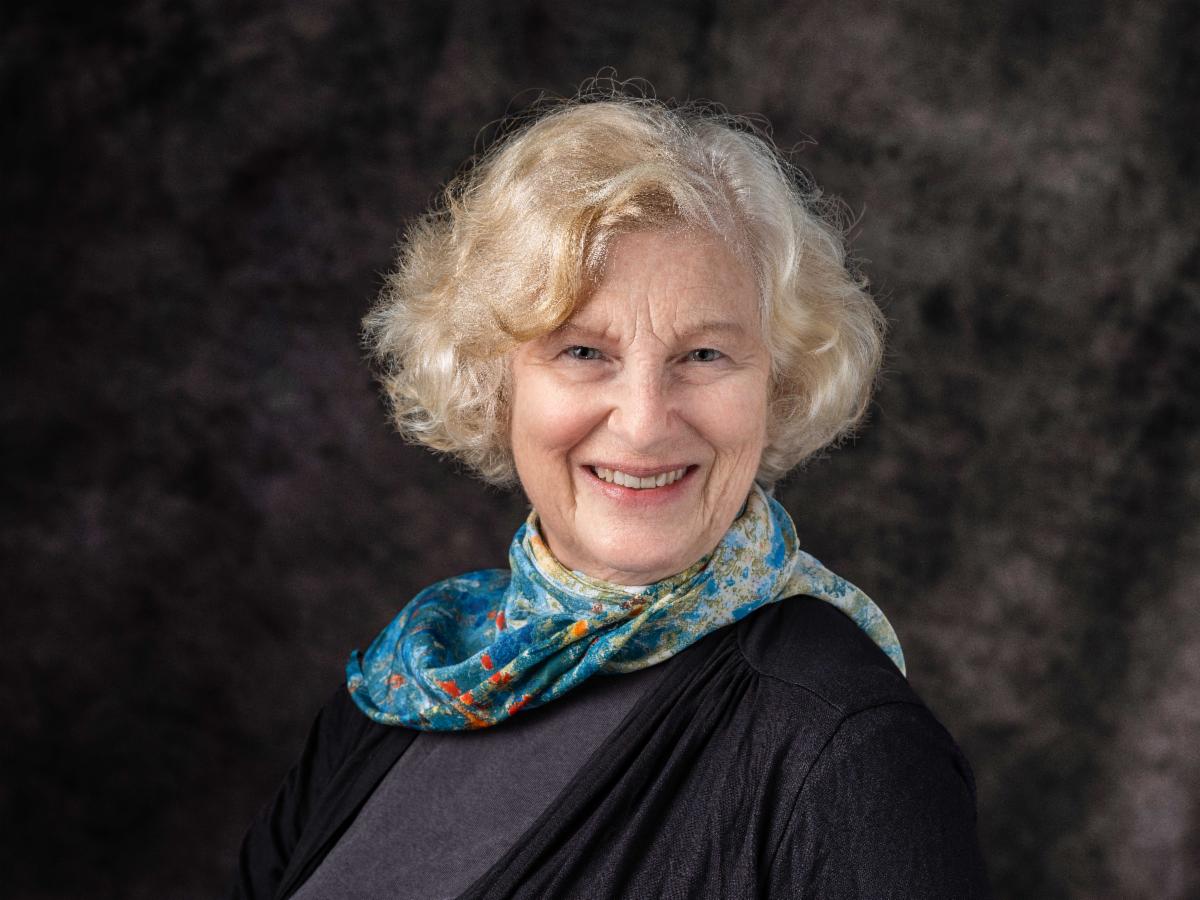
Ellen Cassedy was a founder and longtime leader of 9 to 5, the national association of women office workers. Working 9 to 5 is her first-person account of this exciting movement, which began in the early 1970’s, mobilizing women across the country to organize for rights and respect on the job. The movement inspired Jane Fonda’s hit movie and Dolly Parton’s enduring anthem. 9 to 5 is still active today.
Ellen appears in the documentaries “9 to 5: The Story of a Movement” and “Still Working 9 to 5.” Ellen is a playwrite and an award-winning translator of Yiddish and author.
Praise for Working 9 to 5
“In her latest work, feminist trailblazer Ellen Cassedy takes us through her journey as a founder of the 9 to 5 movement, where ten brave women came together to take a stand against sexism in the workplace. Their battles fought at the intersection of the women’s movement and the labor movement are even more relevant today, making Working 9 to 5 a must-read for any activist or reader in search for a piece of inspiration.”
— LIZ SHULER, President, AFL-CIO
“A fresh and timely resource for labor educators that underscores the power of workers to change conditions inside and outside the workplace.”
— MARY BELLMAN, President, United Association for Labor Education (UALE)
“If we organize we can change the world. This book gives us a detailed and personal view of how a determined group of women organized and achieved more than they ever imagined.”
— HEATHER BOOTH, Founder, Midwest Academy
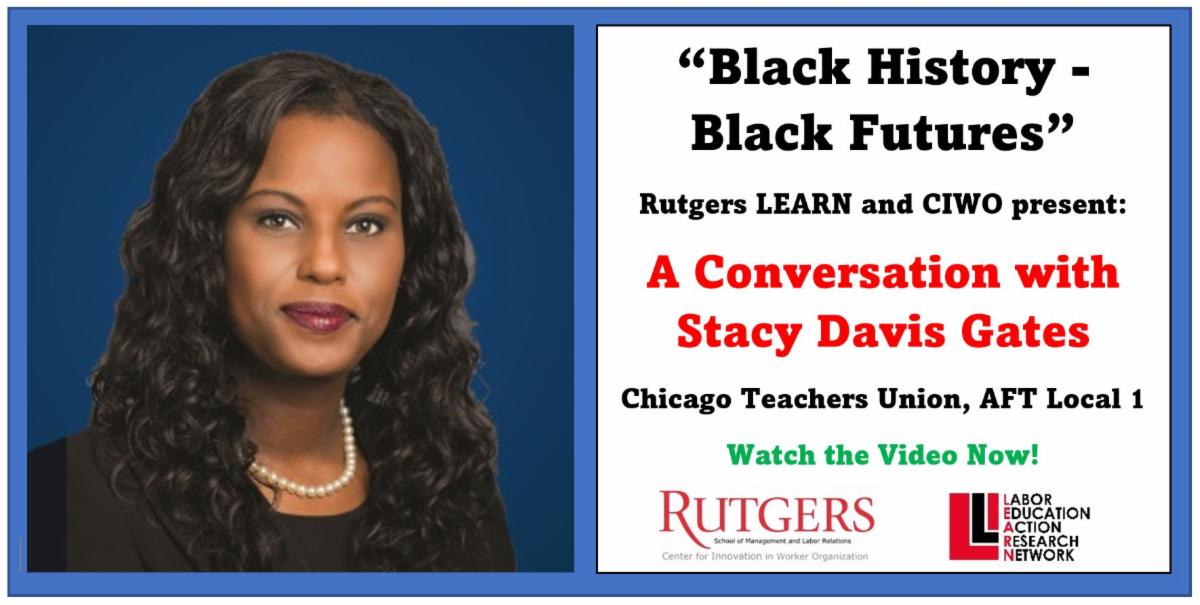
As part of SMLR's ongoing celebration of Black History Month, LEARN partnered with the Center for Innovation in Worker Organization (CIWO) to host a conversation with the dynamic Stacy Davis Gates, Vice President of the Chicago Teachers Union, AFT Local 1.
About Stacy Davis Gates
Prior to her current role as vice president at the CTU, Stacy Davis Gates served as the union’s Political and Legislative Director. In the fall of 2019, she helped to lead a 15-day strike and to negotiate an historic contract that provides for smaller class sizes, ensures a nurse and social worker in every Chicago public school, secures sanctuary protections for immigrant families, and supports students and families experiencing homelessness.
While at the CTU, Ms. Davis Gates has been the architect of bold political and legislative campaigns for the schools and city that all Chicagoans deserve. She has raised millions of dollars to elect classroom teachers to all levels of local government and to challenge school privatizers and union-busters. Ms. Davis Gates has also spearheaded statewide legislative campaigns to pass the strongest charter school accountability measures in the country, push for the restoration of the bargaining rights of Chicago Public Schools employees, and fully fund public education by ending tax loopholes for the 1%.
In 2017, Ms. Davis Gates was elected Chair of United Working Families, an independent political organization by and for working-class people and our movements. She also serves as a board member for the Action Center on Race & the Economy (ACRE), a nexus for organizations working at the intersection of the struggle for racial justice and Wall Street accountability.
Ms. Davis Gates is currently on leave from the classroom, where she taught high school social studies for over a decade at Englewood, Clemente, and Mason Community Links High Schools. She attended Saint Mary’s College, the University of Notre Dame, and Concordia University. Ms. Davis Gates lives on the South Side of Chicago with her husband and three children.
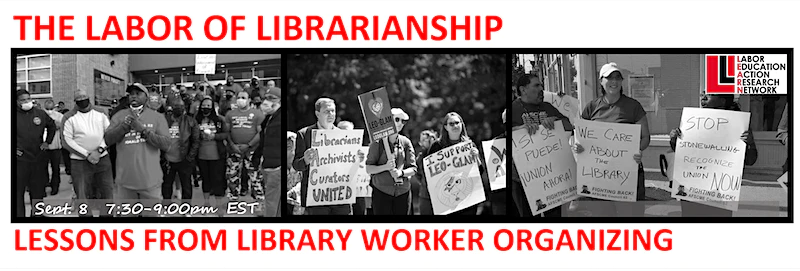
As with other industries and occupations, unions play an important role in libraries all across the country. Being able to use a collective voice to bring about positive change has empowered library workers to not only improve their wages, hours, and working conditions but to be stronger advocates for defending, improving, and expanding one of the most democratic institutions in the U.S. – the library. This work has become even more crucial in recent years.
Unionized library workers, organizers, activists, and scholars came together on September 8, 2022, for a discussion of what the future of organized labor in libraries might look like, and what the movement to organize library workers seeks to accomplish. The program was moderated by Michelle Chen.
Michelle Chen is a contributing writer for The Nation and In These Times. She is also a contributing editor at Dissent magazine and a co-producer of the Asia Pacific Forum podcast and Dissent’s Belabored podcast. She is a postdoctoral fellow in Labor History at Cornell University's School of Industrial and Labor Relations.
Panelists:
Meredith Kahn, LEO-GLAM, AFT-MI Local 6244, University of Michigan libraries
Andrea Lemoins, founder of Concerned Black Workers at the Free Library of Philadelphia, AFSCME DC47 Local 2187
Michael Torres, AFSCME DC962 Local 3395, Indy Public Library
The Center for Global Work and Employment, the Labor Education Action Research Network (LEARN), and the Center for Environmental Justice at Colorado State University hosted a discussion on the Just Transition Listening Project (JTLP)’s 2021 report Workers and Communities in Transition.
Authors and JTLP Organizing Committee members J. Mijin Cha (Occidental College), Vivian Price (California State University Dominguez Hills), Dimitris Stevis (Colorado State) and Todd E. Vachon (Rutgers) introduce the JTLP’s work and present the report’s main findings and the presentation is followed by an extended Q&A with the audience.
Click here to watch the recording
In the past decade, the unionization of museum workers has seen great increases. While non-profit cultural institutions do not conform to many Americans’ image of workspaces that need organizing, those who labor in art, history, and natural science museums are often treated as disposable, exploitable workers who should tolerate poor working conditions, low pay, and inconsistent scheduling in exchange for the opportunity to “contribute to the social good.” At museums that have remained open or reopened while Covid-19 remains a threat, the pandemic has helped to ramp up calls for collective bargaining rights that will bring greater health and safety protections.
On October 18, LEARN brought together unionized museum workers, organizers, activists, and scholars for a discussion of what the future of organized labor in museums might look like, and what the movement to organize cultural workers seeks to accomplish. Moderated by Sarah Jaffe.
In celebration of Dorothy Sue Cobble’s new book, For the Many, LEARN partnered with the Center for Women and Work on May 13 for a discussion about the history and future of the global fight for women’s rights and economic justice.
View the recording
Since its original publication in 1972, no book has done as much as Jeremy Brecher’s Strike! to bring U.S. labor history to a wide audi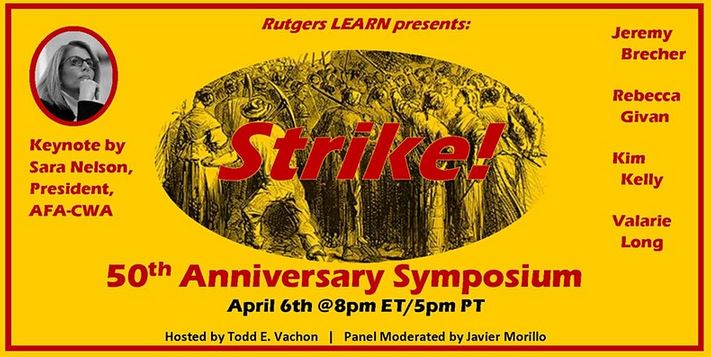
To consider the legacy of Strike!, including lessons for the current political-economic moment, we are joined in conversation by a panel of respected labor leaders, scholars, and journalists, including an opening keynote by Sara Nelson, International President of the Association of Flight Attendants-CWA.
Opening Keynote
Sara Nelson, International President, AFA-CWA
Panelists
Valarie Long, International Executive Vice President, SEIU
Kim Kelly, Freelance writer and organizer
Rebecca Kolins Givan, Associate Professor of Labor Studies, Rutgers SMLR
Jeremy Brecher, Policy Director, Labor Network for Sustainability, and author of Strike!
Panel Moderator
Javier Morillo, fellow, Center for Innovation in Worker Organization
Host
Todd E. Vachon, faculty coordinator, Rutgers LEARN
This panel draws on the newly published, Strike for the Common Good: Fighting for the Future of Public Education, edited by Rebecca Kolins Givan and A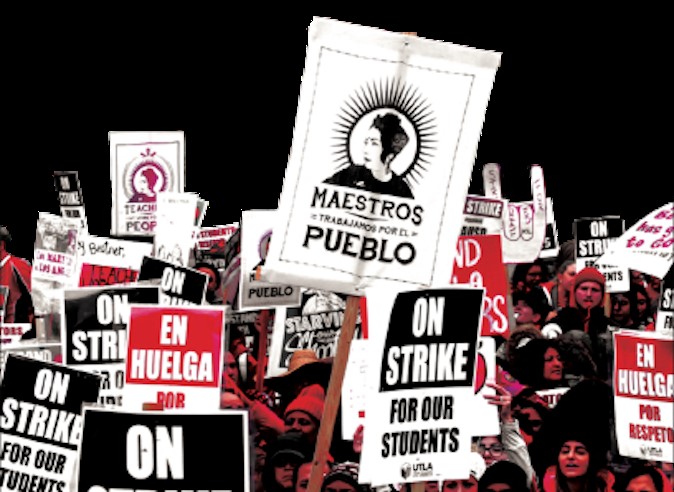 my Schrager Lang. The panel discusses diverse perspectives on recent teachers’ strikes, where teachers struck for the schools their students need and deserve.
my Schrager Lang. The panel discusses diverse perspectives on recent teachers’ strikes, where teachers struck for the schools their students need and deserve.
Featuring:
Rebecca Garelli, Arizona Educators United
Marshé Doss, Students Deserve
Joseph McCartin, Kalmanovitz Initiative for Labor and the Working Poor
Rebecca Givan, Rutgers University
Kenzo Shibata, moderator, Chicago Teachers Union
Click here for the video recording
In celebration of Black History Month 2021, Rutgers LEARN, in partnership with the Center for Innovation in Worker Organization, is delighted to share with you a conversation with one of the labor and civil rights movement’s great leaders, Mr. William Lucy.
When two sanitation workers were killed by a malfunctioning garbage truck in Memphis, Tennessee in February 1968, the city’s fed-up public 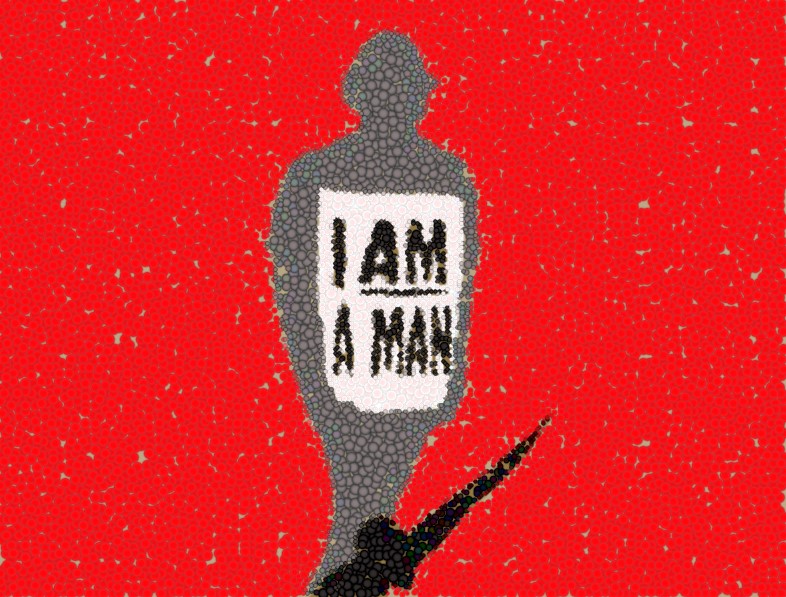 works employees went on strike to demand safer working conditions and higher wages.
works employees went on strike to demand safer working conditions and higher wages.
The American Federation of State, County, and Municipal Employees (AFSCME) dispatched a young, up-and-coming union official named William Lucy to help the 1,300 striking workers—all Black men—in their struggle.
Lucy knew they “needed some glue to hold this together.” He worked with a local pastor, Malcolm Blackburn, to create a slogan small enough to fit on a placard but powerful enough to unite the city. They thought about systemic racism in the South, and the generations of Black boys who grew up to be grandfathers without ever being treated as men by white society. That’s when it hit them.
“We came up with the sign that simply said, in four words, “I AM a Man,” Lucy said. “It was the shortest phrase that we could get that would instill in them a sense of pride, not just for what they had done but what they were doing to try to change the system.”
Lucy, now 87, recalled the story and much more in a wide-ranging interview with Francis Ryan, a labor historian and LEARN instructor in the School of Management and Labor Relations (SMLR) and author of "AFSCME’s Philadelphia Story: Municipal Workers and Urban Power in the Twentieth Century."
The conversation was recorded on Feb. 25, 2021 as part of SMLR’s commemoration of Black History Month and will be permanently housed on the school’s website as part of an archive of workers voices.
We hope you enjoy the conversation and find inspiration in the words of one of the great leaders in our ongoing collective struggle for workers’ rights and justice.
With the inauguration of a new Presidential administration comes a new set of policy priorities, the appointment of a new cabine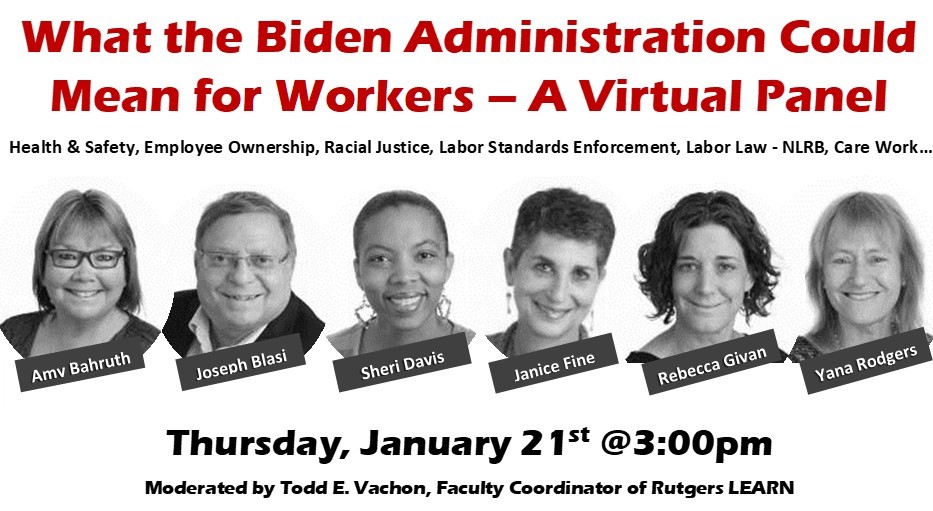 t, and staffing changes throughout the executive branch. These changes, including in the Department of Labor, the National Labor Relations Board, and OSHA, can and often do have a profound impact on workplaces and workers. With the marked rise of partisan polarization in recent decades, these shifts have only grown in magnitude, especially when transitioning between presidential administrations of different political parties.
t, and staffing changes throughout the executive branch. These changes, including in the Department of Labor, the National Labor Relations Board, and OSHA, can and often do have a profound impact on workplaces and workers. With the marked rise of partisan polarization in recent decades, these shifts have only grown in magnitude, especially when transitioning between presidential administrations of different political parties.
To discuss what a Biden administration could mean for workers, we have assembled a panel of experts from the Rutgers School of Management and Labor Relations to offer some insight into six key areas Amy Bahruth discussed Workplace Health & Safety, Joseph Blasi discussed Employee Ownership, Sheri Davis discussed Racial Justice, Janice Fine discussed Labor Standards Enforcement, Rebecca Givan discussed Organizing and Employment Relations, and Yana Rodgers discussed Care Work. The Panel was moderated by LEARN Faculty Coordinator, Todd Vachon. An interview about the panel with Todd can be found on Rutgers Today here.
Resources Shared on this Webinar
This event was organized by the Center for Global Work and Employment in cooperation with LEARN and the Transatlantic Labor Institute. Under the impact of COVID-19, the level of unemployment in the United States has risen to about twice that in Europe, with low-income people, BIPOC communities (Black, Indigenous, and People of Color), and women disproportionately bearing the brunt of the pandemic’s labor market fallout. This webinar explores how European countries have used “short-time” employment schemes to buffer economic displacement by allowing companies to apply for publicly sponsored wage replacement as they reduce employees’ work hours (including to zero). Click here for a video recording of the webinar and links to the PowerPoint presentations.
Click here to learn more about our COVID-19 Update Webinar Series co-sponsored by The Work Environment Council and Jersey Renews.
Be sure to follow LEARN on Facebook to stay up to date with upcoming webinars.
Contact Us

Todd Vachon
Director
todd.vachon@rutgers.edu

Djar Horn
Labor Education Specialist
djar.horn@rutgers.edu

LaToshia Wells
Program Coordinator
latoshia@smlr.rutgers.edu
Email: learn@work.rutgers.edu



